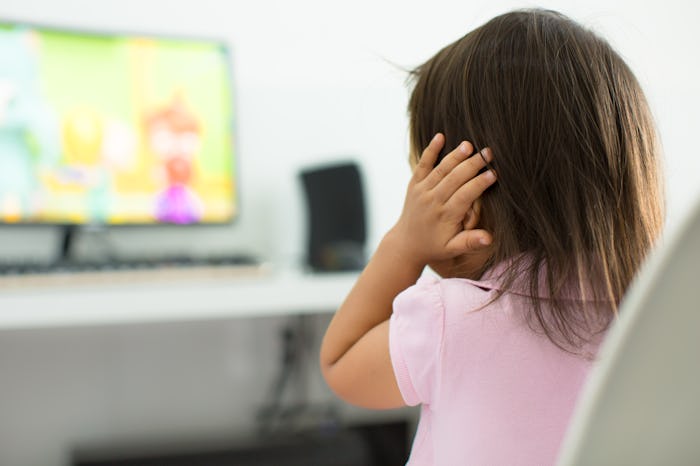Parenting isn't easy, to say the very least, and it can be heartbreaking for a parent or caregiver watch a child struggle. Yet experiencing struggle is an inevitability of the human existence, so aiding our children in navigating their mental health is vital. So, how do you help a child with anxiety? And, just as importantly, how do you spot the signs of anxiety in a child?
Romper spoke to Dr. Allison Winik, an instructor of psychology at Columbia University who also serves as a licensed clinical psychologist at the Columbia University Clinic for Anxiety and Related Disorders Westchester, to learn more.
More than 40 million adults in the United States have an anxiety disorder, according to the National Alliance on Mental Illness (NAMI), making anxiety the most prevalent mental health concern in the country. But this issue is not the exclusive to adults: approximately 8% of children and teens experience anxiety disorders, too.
So the first thing to know is that everyone experiences anxiety sometimes. And, according to Dr. Winik, that can even be a good thing. "There are lots of good forms of anxiety that can be adaptive," she tells Romper, such as getting nervous about a test so that you're prompted to study. "Anxiety becomes problematic when it becomes illogical, persistent, and interferes with a child's functioning."
Children can experience a lot of the worried thoughts and fears we associate with adult anxiety disorders, but their response to those feelings may look very different than we might expect. Some signs may be what we'd think of as "typical," like a child clinging to a parent, avoiding social situations (like parties, playdates or school), having nightmares, or demonstrating escapist behavior. But some manifestations of anxiety can look like other issues and, unfortunately, kids are often misdiagnosed.
For example, fidgeting and difficulty concentrating, sitting still, or relaxing can lead some parents to suspect their child has attention-deficit/hyperactivity disorder (ADHD), but can just as easily be signs of anxiety. Other children experiencing a "fight or flight" response to a stressful situation may display oppositionality or aggression. "Parents or teachers often interpret those behaviors as tantruming or acting out... and they're labeled as 'problem children,'" Dr. Winik says. But in fact, "acting out" and aggression can be signs of anxiety. This is why professional assessment is often important.
It's ultimately unhelpful for parents to support or accommodate a child's desire to avoid something that makes them anxious.
"Children may have trouble verbalizing [their anxiety]," Dr. Winik continues, and, indeed, some signs may not even be behavioral. Many children express their anxiety through physical symptoms. Difficulty sleeping, headaches, stomachaches, and nausea, for example, may be the only way a child can indicate that something is wrong.
But what causes anxiety? Winik says there's often a neurobiological tendency toward an anxiety disorder. "But for people who are genetically and biologically wired for anxiety," she says, "there may be environmental factors that activate or exacerbate their anxiety, such as stressful life events or exposure to messages that promote anxious thinking, such as anything less than an A grade is a failure." Big events such as moving, the death of a family member (or even a pet), or graduating to a new school may be the trigger that kicks a predisposed child's anxiousness into gear. Some children may develop particular phobias as a result of an experience. If a big dog once growled at them as a toddler, for instance, they may generalize that fear to all dogs.
Parents may not be able to "cure" their child's anxiety, but there are techniques that can help your child learn to cope. Winik says that one of the best things a parent can do is to give their child an emotional vocabulary so that they can express how they're feeling. "It we don't know what we're feeling it's had to then know how to cope and help ourselves feel better."
"Gently bring attention to the anxiety," Winik continues, and then help the child label what they're feeling. "You could say, 'You're letting me know you're stomach is hurting, and I'm sorry your stomach is hurting. Sometimes our stomach hurts when we're worried. Is there anything you're worried about?'" Other techniques, such as breathing, focusing on another activity, or even going for a walk can be helpful, Winik says, but should be done in conjunction with labeling the emotions a child is expressing when they're anxious.
Winik also encourages parents to fight the urge to shield their child from stressful situations. "It's ultimately unhelpful for parents to support or accommodate a child's desire to avoid something that makes them anxious," she says. Of course, that can be difficult for a parent who doesn't want to see their child struggle, but avoiding such situations also means avoiding learning how to cope.
If you or someone you know is seeking help for mental health concerns, visit the National Alliance on Mental Health (NAMI) website, or call 1-800-950-NAMI(6264). For confidential treatment referrals, visit the Substance Abuse and Mental Health Services Administration (SAMHSA) website, or call the National Helpline at 1-800-662-HELP(4357). In an emergency, contact the National Suicide Prevention Lifeline at 1-800-273-TALK(8255) or call 911.
